Related Research Articles
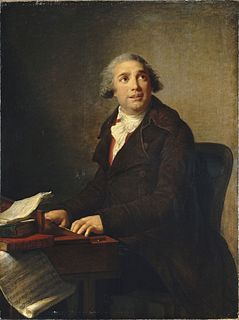
Giovanni Paisiello was an Italian composer of the Classical era, and was the most popular opera composer of the late 1700s. His operatic style influenced Mozart and Rossini and whose music was championed by Haydn and Beethoven.
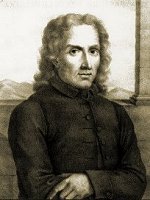
Leonardo Leo, more correctly Lionardo Oronzo Salvatore de Leo, was a Baroque composer.

Francesco Feo was an Italian composer, known chiefly for his operas. He was born and died in Naples, where most of his operas were premièred.

Francesco Domenico Araja was an Italian composer who spent 25 years in Russia and wrote at least 14 operas for the Russian Imperial Court including Tsefal i Prokris, the first opera in Russian.

La finta parigina is an opera buffa in 3 acts by Domenico Cimarosa with an Italian libretto by Francesco Cerlone. The opera premiered at the Teatro Nuovo in Naples, in 1773.
Domenico Fischietti (1725–1810) was an Italian composer.
Antonio Palomba (20 December 1705 - 1769) was an Italian opera librettist, poet, harpsichordist, and music educator. He also worked as a notary. Born in Naples, he became a teacher of the harpsichord at the Teatro della Pace in 1749. Most of his more than 50 opera libretti were comedic works written for composers of the Neapolitan school. He also wrote some works for performance in Florence, Bologna and abroad. He died in Naples in 1769; one of the victims of a fever epidemic in the city. Many of his libretti were set more than once to music, and composers continued to use his libretti up into the 1830s.
Michele Gabellone was an Italian composer best known for his operas.
Matteo Capranica was an Italian composer. Born in Amatrice, Capranica studied at the Conservatorio di Sant'Onofrio a Porta Capuana in Naples under Nicola Porpora, Ignazio Prota, and Francesco Feo. After completing his studies he worked as maestro di cappella at various churches in Naples and devoted himself to music composition of both sacred and secular works. He was for many years organist at the Naples Cathedral. His first opera, Carlo, premiered at the Teatro Nuovo in Naples in 1736. He went on to compose eight more operas through 1753. His other works include 2 oratorios, 2 masses, 2 sonatas, a cantata, several works for harpsichord, and various arias and duets for singers. He died in Naples.
Ignazio Prota was an Italian composer and music educator. He was the father of composer Tommaso Prota and the grandfather of composer Gabriele Prota.

Luca Antonio Predieri was an Italian composer and violinist. A member of a prominent family of musicians, Predieri was born in Bologna and was active there from 1704. In 1737 he moved to Vienna, eventually becoming Kapellmeister to the imperial Habsburg court in 1741, a post he held for ten years. In 1765 he returned to his native city where he died two years later at the age of 78. A prolific opera composer, he was also known for his sacred music and oratorios. Although his operas were largely forgotten by the end of his own lifetime and most of their scores lost, individual arias as well some of his sacred music are still performed and recorded.

The Teatro Capranica is a theatre situated at 101 Piazza Capranica in the Colonna district of Rome. Originally constructed in 1679 by the Capranica family and housed in the early Renaissance Palazzo Capranica, it was the second public theatre to open in Rome. It was the site of many premieres of Baroque operas including Caldara's Tito e Berenice, Scarlatti's Griselda, and Vivaldi's Ercole su'l Termodonte. The Capranica ceased operating as a full-scale theatre and opera house in 1881 and in 1922 was converted into a cinema. Following the closure of the cinema in 2000, it has functioned on a hire basis as a conference and performance venue.
Gennaro Antonio Federico was a Neapolitan poet and opera librettist. He is best remembered for his collaborations with G. B. Pergolesi including La serva padrona.
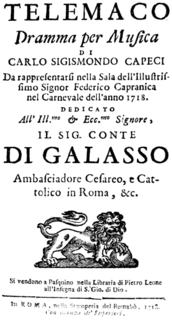
Telemaco, ossia L'isola di Circe is a 1718 opera by Alessandro Scarlatti to a libretto by Carlo Sigismondo Capece, court poet to Queen Maria Casimira of Poland, living in exile in Rome, for the Teatro Capranica in Rome, where it was premiered during the carnival season. The opera was revived in 2005 by the Schwetzingen Festival and the Deutsche Oper am Rhein.
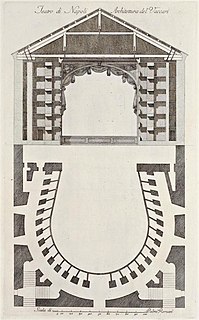
The Teatro Nuovo is a theatre located on Via Montecalvario in the Quartieri Spagnoli district of Naples. The original theatre was an opera house designed by Domenico Antonio Vaccaro. Completed in 1724, it was also known as the Teatro Nuovo sopra Toledo and the Teatro Nuovo de Montecalvario. The theatre specialised in the opera buffa genre and saw the world premieres of hundreds of operas in its heyday. These included fifteen of Cimarosa's operas and seven of Donizetti's. The present theatre is the third to have been erected on the site following its destruction by fire in 1861 and again in 1935.

Antonio Orefice was an Italian opera composer active in Naples. His Patrò Calienno de la Costa was the first opera buffa in Neapolitan dialect to be performed on a public stage.
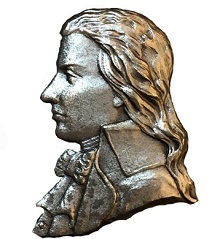
Luigi Capotorti was an Italian composer of both sacred and secular music. He was the maestro di cappella of several Neapolitan churches; the composer of ten operas, five of which premiered at the Teatro San Carlo in Naples; and a teacher of composition and singing whose students included Stefano Pavesi and Saverio Mercadante. Born in Molfetta, he studied violin and composition at the Conservatorio di Sant'Onofrio in Naples and spent his entire career in that city. In his later years, Capotorti retired to San Severo, where he died at the age of 75.
References
- ↑ Edward J Dent: Selected Essays 0521221749 1979 - - Page 53 Cavaliere Leo identified this with Amor vuol sofferenze by comparing it with the complete libretto in the same library, and I was fortunate enough to find the opera complete at Montecassino. A study of the score and libretto showed us that the ...
- ↑ L'archivo musicale di Montecassino -Eduardo Dagnino - 1929 - Page 284 Leonardo Leo Eccone la statistica : 22 volumi di partiture teatrali (16 opere), 6 miscellanee, 2 oratori : totale 30. Opere complete: Alidoro (unico), Amor vuol sofferenza, Argene, (forse autografo, porta la firma e la data 1735), Ciro, Demofoonte, Emira (unico) .
- ↑ Stefano Capone, Carmela Lombardi - L'opera comica napoletana (1709-1749) 2007 G.A. Federico, opera comica, Napoli, Teatro dei Fiorentini] 1739 - Amor vuol sofferenza [libr. G.A. Federico, opera comica, Napoli, Teatro Nuovo sopra Toledo] 1 740 - Alidoro [libr. ... Teatro dei Fiorentini] 1 744 - La finta frascatana [è una versione di Amor vuol sofferenza completata da M. Capranica per la morte di Leo.